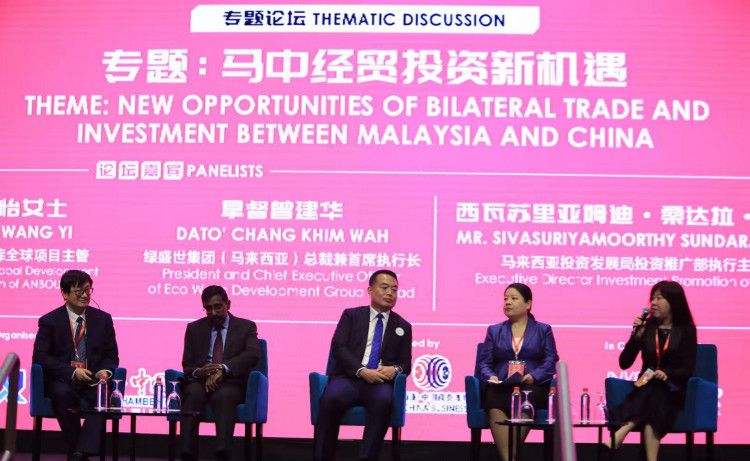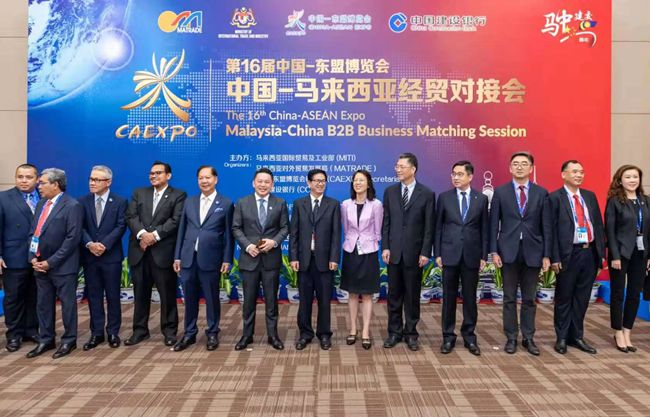With the Regional Comprehensive Economic Partnership (RCEP) coming into force in Malaysia on March 18, China-Malaysia economic and trade cooperation has delivered new dividends and presented new opportunities. According to the latest statistics report of Malaysia's Ministry of International Trade and Industry, China remained Malaysia's largest trading partner in the first quarter of this year and is also an important driving force for Malaysia's foreign trade recovery. In March, China-Malaysia trade recorded double-digit growth for 16 consecutive months.
It is worth mentioning that the Malaysia-China (Guangxi) Investment Forum and the celebration of the 10th anniversary of the construction of the "Two Countries and Two Parks" between China and Malaysia were held recently. This is not only a demonstration of the deepening economic and trade cooperation between China and Malaysia, but also a new journey for the two sides to embark on a new journey together under the RCEP open market.
The cooperation between the two countries and the Two Parks has yielded new fruits
During the forum, Chinese and Malaysian enterprises signed 11 investment and strategic cooperation agreements concerning the "two countries and two Parks" between China and Malaysia, which became an important achievement of the forum. Which sit together to build west Lu Haixin channel port and qinzhou port logistics important nodes in the building and the horse "double garden" between the two countries + new international sea trade channels, to jointly develop international logistics park, ma Dan industrial park overspending: cold chain logistics operation and other cooperation projects, will be based on "two parks" "two port" advantage provide important logistics support for cross-border industrial chain building; Boser's downstream project of "Coke Aluminum and Manganese Cycle", The bulk trade of non-ferrous metals between China and Malaysia, as well as industrial cooperation in bird's nest and durian, will make use of the preferential policies of the RCEP agreement to expand commodity trade between China and Malaysia, which is an important reflection of the overlapping benefits of the "two countries and two parks" industrial interaction between China and Malaysia and the RCEP rules.

China's Ministry of Commerce said, China stands ready to work together with Malaysia high quality implementation of regional comprehensive economic partnership agreements, play a role of Lu Haixin channel for regional industrial chain of the supply chain support, continue to deepen bilateral economic and trade cooperation and promote to build "neighbourhood" all the way high quality development, the "double garden" between the two countries into a Chinese high level demonstration zone for the development of asean economic and trade cooperation innovation, We will contribute to regional economic recovery.
"Building a new land-sea trade corridor is of great significance to China-Malaysia economy and trade." Shanghai municipal party committee party school open Zou Lei, director of the center for strategic studies, said in an interview with the international business newspaper reporter new international sea trade channels connected to the provinces and autonomous regions in western China and southeast Asian countries, China and asean is to build "area along the" flagship project, through building "channel + + network + platform" of the modern logistics system can effectively shorten the transportation distance and time, Reduce logistics transportation costs, to promote the "logistics + trade + industry" positive cycle to create conditions.
"With the implementation of the RCEP, the new international land-sea trade corridor will provide strong support for China and Malaysia to enhance unimpeded trade and industrial complementarity. Especially in the face of the severe challenges posed by COVID-19, the new international land-sea trade channels will not only help stabilize China's foreign trade and foreign investment base, but also help maintain the security and stability of regional industrial chains, supply chains and value chains." Zou Lei said.
As a landmark project of Belt and Road cooperation between China and Malaysia, the cooperation between Qinzhou in Guangxi and Kuantan in Malaysia has made remarkable achievements in the past decade. Now, with the benefits of opening-up brought by the RCEP, there will also be major opportunities to accelerate the upgrading of bilateral cooperation.
Zou said that going forward, the "two Countries and two Parks" should make good use of the RCEP investment protection and promotion dividends, optimize the layout of the industrial chain on the basis of easing market access, and provide a better industrial support and business environment for enterprises. At the same time, we should make good use of the BENEFITS of tariff reduction and trade facilitation from the RCEP. In the follow-up to the "Two Countries, Two Parks" initiative, we should continue to remove hidden barriers, strengthen international cooperation on customs clearance, and improve cross-border trade facilitation.

There is great potential for bilateral investment cooperation
By 2021, China had been Malaysia's largest trading partner for 13 consecutive years and its largest investor in the manufacturing sector for five consecutive years, highlighting the great complementarity and potential of cooperation between the two economies.
On May 5, Chinese Ambassador to Malaysia Ouyang Yujing met with former Malaysian Prime Minister Mahathir Mohamad. The two sides exchanged views on China-Malaysia relations and regional situation. Mahathir said his country hopes to attract more Chinese enterprises, especially high-tech enterprises, to increase investment in Malaysia and push for greater development of mutually beneficial cooperation between the two countries.
Zou said Malaysia has unique market and policy advantages to attract Chinese enterprises to invest and develop. Among ASEAN member states, Malaysia enjoys stable political situation, special geographical location, sound industrial foundation, close external contact, large population scale, market scale and economic volume. It plays an important role in regional economic development and is an important window for Chinese enterprises to enter the ASEAN market. At the same time, Malaysia-China Kuantan Industrial Park provides Chinese enterprises with a number of preferential policies, including full exemption of corporate income tax for up to 15 years, which helps promote sustainable transnational operation of enterprises and actively expand into the regional market while taking root locally.
"In terms of industrial and investment cooperation, apart from traditional pillar industries such as shipping, processing trade and ASEAN featured products, the two sides can further strengthen cooperation in emerging areas such as e-commerce, digital trade, big data, cloud computing, new energy vehicles, biomedicine and new materials to realize complementary advantages." Zou Lei said.
However, Zhong Feiteng, director of major-Country relations at the Institute of Asia-Pacific and Global Strategy under the Chinese Academy of Social Sciences, stressed that under the current complex international situation, Chinese enterprises "going to Malaysia" should pay more attention to guard against political and social risks, and coordinate development and security. Enterprises should listen to the views and needs of local people, so that enterprises can truly integrate into and take root in the local area. At the same time, attention should be paid to the scale of the project, "breaking the whole into parts", cutting the big projects into smaller ones, so that more local enterprises can participate.




